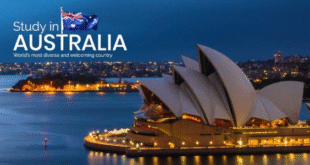A Comprehensive Guide for International Students
Australia has become a top destination for international students seeking quality education, cultural diversity, and promising career opportunities. Whether you’re from Dhaka or anywhere else in the world, studying in Australia offers a unique blend of academic excellence and vibrant student life. In this guide, we’ll explore the benefits of studying in Australia, including insights into teacher activities, study costs, living expenses, and tuition fees.
High-Quality Education and Teacher Engagement
Australia is home to some of the world’s top universities, including the University of Sydney, University of Melbourne, and Australian National University. These institutions are renowned for their rigorous academic programs, cutting-edge research, and world-class facilities.
Teacher Activities and Student Support
Australian educators are committed to fostering an interactive and supportive learning environment. Teachers often employ a variety of teaching methods, including:
Interactive Lectures and Seminars: Engaging students through discussions and debates.
Practical Workshops: Providing hands-on experience in labs and studios.
Online Learning Platforms: Utilizing digital tools for flexible learning.
Student Mentorship Programs: Offering guidance and support for academic and personal development.
These activities not only enhance learning but also prepare students for real-world challenges.
Tuition Fees: An Investment in Your Future
Tuition fees in Australia vary depending on the level of study and the institution. On average:
Undergraduate Programs: AUD 20,000 to AUD 45,000 per year.
Postgraduate Programs: AUD 22,000 to AUD 50,000 per year.
While these fees may seem high, many Australian universities offer scholarships and financial aid to international students. Additionally, the return on investment is significant, with Australian degrees being highly regarded globally.
Living Costs: Affordable and Manageable
Living expenses in Australia are relatively affordable compared to other study destinations like the USA or UK. On average, international students can expect to spend:
Accommodation: AUD 440 – AUD 1,200 per month.
Food & Groceries: AUD 250 – AUD 500 per month.
Transport: AUD 100 – AUD 250 per month.
Utilities & Internet: AUD 150 – AUD 300 per month.
Entertainment & Miscellaneous: AUD 200 – AUD 400 per month.
These costs can vary depending on the city and lifestyle choices. Cities like Sydney and Melbourne are more expensive, while places like Adelaide and Hobart offer more affordable living options.
Work Opportunities and Post-Study Pathways
Australia provides excellent opportunities for international students to gain work experience during and after their studies.
Work While Studying
International students are permitted to work up to 40 hours per fortnight during the academic term and unlimited hours during scheduled breaks. This allows students to support themselves financially and gain valuable work experience.
Post-Study Work Visa (Subclass 485)
After completing their studies, graduates can apply for the Temporary Graduate Visa (subclass 485), which allows them to stay and work in Australia for:
Bachelor’s or Master’s Degree Holders: 2–4 years.
PhD Graduates: Up to 6 years.
This visa provides an excellent pathway to gain international work experience and potentially transition to permanent residency.
Cultural Diversity and Student Life
Australia is a multicultural society, with a significant percentage of its population born overseas. This diversity is reflected in its educational institutions, where students from all over the world come together to learn and grow.
Student Support Services
Australian universities offer a range of support services to help international students adjust to life in Australia, including:
Orientation Programs: Introducing students to university life and Australian culture.
Counseling Services: Providing mental health and well-being support.
Career Services: Assisting with job placements and internships.
Cultural Clubs and Societies: Offering opportunities to connect with peers and celebrate cultural diversity.
These services ensure that students feel welcomed and supported throughout their academic journey.
Scholarships and Financial Aid
To make studying in Australia more accessible, many universities offer scholarships and financial aid to international students. These can help offset tuition fees and living costs. Some notable scholarships include:
Australia Awards Scholarships: Funded by the Australian Government, these scholarships cover tuition fees, living expenses, and travel costs.
Destination Australia Program: Provides scholarships to students studying in regional Australia.
University-Specific Scholarships: Many institutions offer merit-based scholarships for outstanding students.
It’s advisable to research and apply for scholarships early to maximize your chances of receiving financial assistance.
Conclusion
Studying in Australia offers a wealth of opportunities for personal and academic growth. From high-quality education and diverse cultural experiences to affordable living costs and robust work opportunities, Australia provides an ideal environment for international students. By carefully planning your finances, exploring scholarship options, and taking advantage of the support services available, you can make the most of your study abroad experience.
If you’re considering studying in Australia, take the time to research universities, programs, and scholarships that align with your goals. With the right preparation, your journey to Australia can be a rewarding and life-changing experience.

